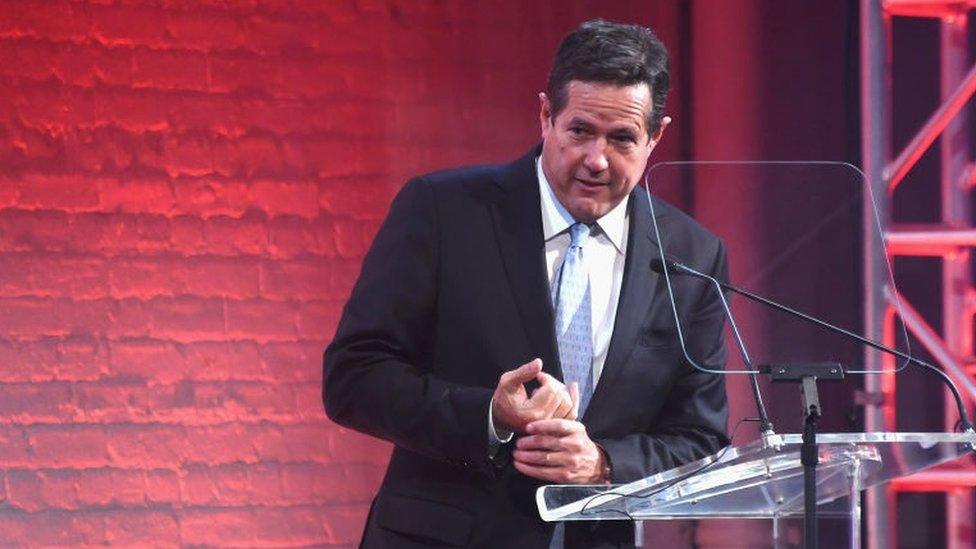Fireworks expected at Barclays annual meeting
- Published

Barclays chief executive Jes Staley
"Who are you going to back? An American living in the UK trying to save Britain's last investment bank or a Brit living in Connecticut trying to destroy it?"
That was how one Barclay's insider described the battle for the future of a home-grown presence in the global investment banking world.
That battle starts in earnest with a showdown later on Thursday between the board and a rebel investor at the annual general meeting of shareholders.
Barclays is made up of two bits. The retail bank that runs current accounts, takes deposits and makes loans - and the investment bank that advises on takeovers and helps companies borrow money or sell shares to investors.
Rebel shareholder
The current attack is on the second bit.
A reclusive, yet activist investor, Edward Bramson, wants to start shrinking the investment bank - putting him on a direct collision course with the bank's chief executive, American Jes Staley, and the rest of the Barclays board. He argues that it doesn't generate enough profit to justify the large amounts of capital required to run it.
He will try to force his way on to the board by asking shareholders to elect him a director, a staging post to his ultimate desire to become chairman.
He has borrowed more than a billion pounds to amass a 5.5% stake - making him Barclays' third largest shareholder, but a long way short of the majority he needs to succeed.
So the question will be how many shareholders will agree with him that for the owners (rather than the workers), investment banking just doesn't pay.
No-brainer?
Mr Bramson's point is simple.
Last year, Barclays earned a return of 7% on the £26bn of shareholders' money which supports investment banking, while it earned 12% on the £10bn allocated to retail banking. It would seem a no-brainer to shrink or exit investment banking and give the shareholders their £26bn back to do something more profitable with.
Not only that, but as we have seen, investment banking is fraught with risk. The regulatory pitfalls can be deep: huge fines for interest rate-rigging, mis-selling risky mortgages and doing business (even unwittingly) with pariah countries. Banks have paid out hundreds of billions for getting this stuff wrong.
Does the UK even need a national investment banking champion? RBS has binned its investment bank and Germany's Deutsche Bank is sounding the retreat from the market.
American investment banks such as JP Morgan and Goldman Sachs have moved into the vacated territory, becoming more dominant globally.
Bonus costs
Barclays chief executive Jes Staley is an investment banker down to his bootstraps. He spent 20 years at JP Morgan and passionately believes it would be a mistake for the world's biggest financial centre (London) to lose a home-grown presence in global capital markets.
There is also the diversification argument. Retail banking is not without risk and there have been times when the margins on retail lending have been pretty thin for the risk of customers defaulting.
The biggest problem with investment banking is that it doesn't work the way it used to. Some of the biggest profits in the heydays were generated by banks making bets with their own money - so called proprietary trading. Post-financial crisis, that was stamped out by regulators. The risks and costs of compliance with more stringent regulation have also risen.
Also, when the good times roll, the employees seemed to fill their boots before the owners got a look in. It's fair to say that bonuses have always been more front-of-mind on trading floors than shareholder returns.
One way of tackling this is to get tough on pay - and Jes Staley will face a potentially serious revolt over his own £3.4m pay packet.
Mr Bramson is certain to lose, but if he manages to persuade another 10% of the shareholders to vote with him, he will be encouraged to stick around. And if the investment bank returns continue to disappoint, he may slowly gather more recruits and look for another crack.
The battle for the future of Barclays and British investment banking is not over yet.